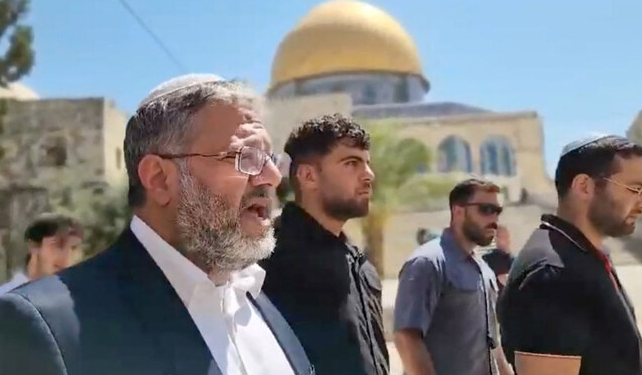Tensions flared again this week after Israel’s far-right National Security Minister Itamar Ben-Gvir visited the Al-Aqsa Mosque compound in Jerusalem, sparking sharp criticism from Pakistan, Saudi Arabia, and Jordan. The visit, which involved Ben-Gvir reportedly praying at the highly sensitive site, was seen by many as a blatant challenge to the longstanding “status quo” arrangement governing the sacred area.
A Controversial Visit Ignites Regional Outrage
Ben-Gvir’s presence at the Al-Aqsa compound, also known to Jews as the Temple Mount, is particularly provocative because the site is governed by a delicate agreement that allows Jewish visitors but prohibits them from praying there. The compound, located in Jerusalem’s Old City, holds profound religious significance for both Muslims and Jews—Muslims consider it the third holiest site, while Jews revere it as the location of the ancient Second Temple.
Following the visit, videos surfaced showing Ben-Gvir leading a group through the compound and allegedly praying, an act that directly contravenes the rules upheld by the Jordanian Waqf, the religious trust managing the site. The Waqf accused Ben-Gvir and a large group of around 1,250 visitors of praying, shouting, and dancing at the site, further escalating tensions.
Regional Governments Condemn the Actions
Pakistan’s Prime Minister Shehbaz Sharif was swift to condemn the visit, labeling it a “storming” of one of Islam’s holiest places. In a statement on social media, he called the incident “a sacrilege” that violates international law and affronts Muslims worldwide. Sharif warned that such provocations not only inflame regional tensions but also threaten peace efforts in the Middle East.
He reiterated Pakistan’s call for an immediate ceasefire in the Palestinian territories and urged the revival of a credible peace process that leads to the establishment of an independent Palestinian state with East Jerusalem—Al-Quds Al-Sharif—as its capital, in line with UN resolutions.
Saudi Arabia’s Ministry of Foreign Affairs echoed these sentiments, condemning what it described as repeated provocative acts by Israeli officials. The kingdom warned that such actions deepen the conflict and called on the international community to intervene to uphold international law and protect peace in the region.
Similarly, Jordan, the custodian of the Al-Aqsa site, denounced the visit as “unacceptable provocation.” The Jordanian Foreign Ministry emphasized the sensitivity of the site and its importance as a symbol of Palestinian identity.
The Broader Implications and Reactions
The status quo arrangement, which Israel has maintained since its occupation of East Jerusalem in 1967, permits non-Muslim visits under strict conditions to avoid inflaming tensions. However, Ben-Gvir’s actions are widely viewed as deliberately provocative, undermining these fragile arrangements.
Hamas, the Palestinian Islamist group, condemned the visit as a “provocative and dangerous escalation” and framed it as part of a broader pattern of aggression against Palestinians. They urged Palestinians, especially youth in the West Bank, to escalate resistance in defense of their land and sacred sites.
This episode underscores the fragility of peace in the region, where religious and political sensitivities intertwine deeply. The repeated flare-ups around Al-Aqsa highlight the urgent need for renewed diplomatic efforts to prevent further destabilization.
In a region already rife with conflict, visits like Ben-Gvir’s risk igniting deeper confrontations. The international community’s response and efforts to uphold the status quo and respect for religious sites remain crucial to avoiding wider escalation.

